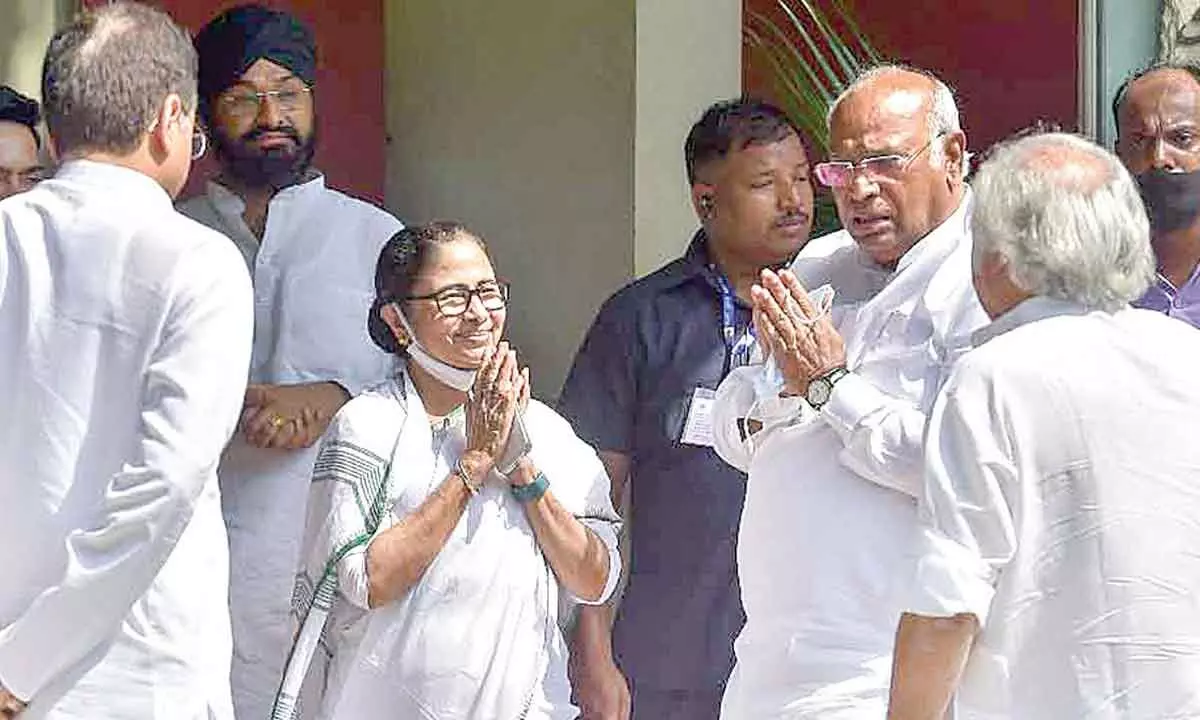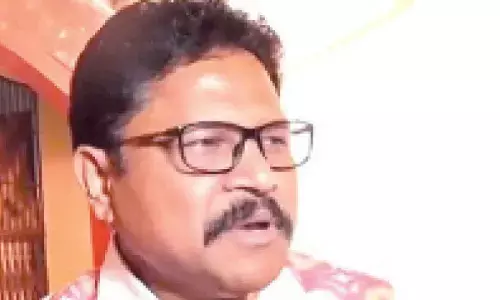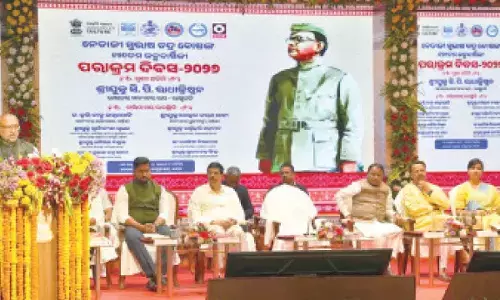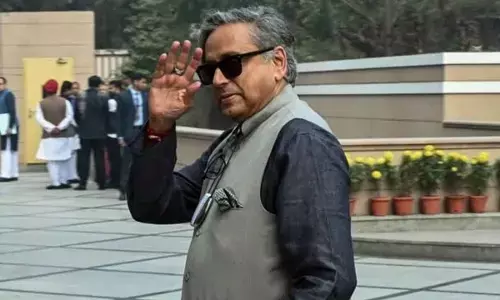Opposition more vulnerable than before

India's presidential and vice-presidential elections have been a routine affair, generally perpetuating the political realities of the time.
India's presidential and vice-presidential elections have been a routine affair, generally perpetuating the political realities of the time. The 2022 polls though, with the Modi-Shah led perpetually-in-election-mode BJP on the one side and the crumbling and rudderless Opposition on the other, have managed to alter political realities. In fact, their respective upward and downward trajectories have been further accentuated in the course of these polls. This is characteristic of the BJP in the Modi era, creatively treating every development as a stepping stone for furthering its political stock. It is characteristic of the Opposition in the Modi era as well, prone to blundering incessantly and unnecessarily.
For the BJP, the Opposition's candidature of Yashwant Sinha was what could be described in cricketing terminology as a full-toss. It did not help that the selection process took place in the public domain and that Sinha being the fourth choice was public knowledge. The Opposition could have scored a "moral victory" by fielding a dignified and eminent personality whose work resonated with the masses, or a grassroots personality whose story resonated with the masses. It chose instead to go with a known Modi-baiter who had unceremoniously quit the BJP.
Prone to public meltdowns, Sinha with his bureaucratic background was the archetypal political elite far removed from ground reality. Nothing demonstrated these credentials better than his tweet on results day. As Sonia Gandhi drove down to the ED's office for questioning that day, Sinha tweeted that the ED should have instead gone to Sonia's residence if they wished to speak with her.
The BJP hit this full-toss out of the park by fielding Droupadi Murmu, who represented the opposite of everything Sinha did. Murmu is from a tribal family in Odisha. A self-made woman, she has climbed the ranks diligently, and her track record speaks for itself despite the low profile she has maintained. At the political level, Murmu's candidature was a symbol of empowerment for women as well as tribals across India.
For most of independent India's history, tribals have been neglected despite their large presence in many states. Many sections of the Opposition were quick to grasp the political ramifications, and threw their lot with Murmu or consciously played down Sinha's candidature. Sinha remarking that the BJP was hiding behind an SC/ST lady did not help the Opposition's case. At the ideological level, the elite versus grassroots debate which has found many formulations such as India versus Bharat or Old India versus New India, was on full display. This debate has been a tried and tested formula for the Modi dispensation to score points against its adversaries.
With elections round the corner in states with sizeable tribal populations, Murmu's selection is likely to give the BJP a greater edge. Fearing this, several legislators from tribal-dominated areas cutting across party lines defied their parties' decisions and voted for Murmu. Open defiance to the leadership in various Opposition parties, predominantly in the Congress, therefore became an unintended consequence of the presidential elections.
The 2022 presidential and vice-presidential elections have turned out to be particularly problematic for the Congress. At least six important state elections before 2019 — Gujarat, Himachal Pradesh, Karnataka, Madhya Pradesh, Chhattisgarh and Rajasthan — had the Congress as a major player, and was pitted directly against the BJP at that. Most of these states have a sizeable tribal population. However, the fact that legislators across the country do not care anymore about the official party line and are ready to defy the Gandhi family, is likely to cause further unrest within the party.
The 2022 presidential and vice-presidential elections have also raised the question about the Congress' relevance within the Opposition. The fact that Sharad Pawar and Mamata Banerjee had a greater role to play in choosing the Opposition's presidential candidate and that the Congress simply played along, was the first sign. Next was the selection of Margaret Alva for the vice-presidential candidature. Despite Alva's long tenure in the Congress, it is well-known that her book and her interviews have caused huge damage to the reputation of the Gandhi family.
It is not known whether the family had a choice or had to simply play along with her candidature. But the biggest blow came with the Trinamool Congress deciding not to support Alva's candidature. It is clear that after soliciting support for Yashwant Sinha, Mamata Banerjee left the Congress high and dry with this move. The Congress seems unable to pull its own weight even within the Opposition's rank and file.
The BJP's choice to field Jagdish Dhankhar also seems well-planned. As governor, Dhankar has been at the forefront of tackling the state-backed excess in Bengal, and is considered among the sharpest legal brains in the country. Moreover, Dhankhar comes from the Jat community. The two major Hindu voting-blocks north of the Vindhyas that have dithered in their support to the BJP have been the Jats and the Marathas. With Dhankhar as vice-president and the advent of Eknath Shinde propped up by the BJP, the saffron party has attempted to turn the tables on both fronts. With Dhankhar though, there is more to it than meets the eye.
The Trinamool Congress has played an interesting role in these elections. Other than the Opposition's candidate belonging to their party, Mamata seems quite satisfied with the fact she will no longer have to deal with Dhankhar in Bengal. According to certain reports, the Trinamool Congress was even considering supporting Dhankhar's nomination initially. There is little doubt however that Mamata was informed beforehand about Dhankhar's candidature in a meeting that she held with Dhankhar and Himanta Biswa Sarma in Darjeeling. Why she was informed beforehand and what deal she might have struck with the BJP is anybody's guess.
Some reports have argued that she will field weak candidates against the BJP in some seats of Bengal in 2024 and give the saffron party a walkover. It is quite intriguing that Banerjee has not come out in support of her close aide Partha Chatterjee who has been put under arrest by central agencies for corruption, and has chosen instead to distance herself from him. Another theory that this writer has, is that the deal goes far beyond Dhankhar. It is possible that she batted for Sinha and got the Opposition to field him at the BJP's behest. Although it is far-fetched, the results are for all to see.
If Mamata has managed to squeeze out a favourable deal for herself, she is perhaps the only Opposition leader to have benefited from the presidential and vice-presidential elections. On the whole, these elections have been a disaster for the Opposition's unity, its reputation, its vote-bank and the maintenance of internal order within its members. It has left the Opposition more depleted, divided and vulnerable than before.
The best example of the disarray in the Opposition camp was the setting up of an office for vice-presidential candidate Alva and using it to reach out to chief ministers and solicit their support. The fact is that state Assemblies play no role in the vice-presidential elections, and the Opposition became a laughing stock when Himanta Biswa Sarma had to publicly point this out.
While the BJP has used these elections to strengthen its hands ahead of the upcoming state polls and the 2024 general elections, its moves have weakened the Opposition considerably. However, as has been the case repeatedly, the Opposition's weakening is once again predominantly a consequence of its own making. (Courtesy: Firstpost)










